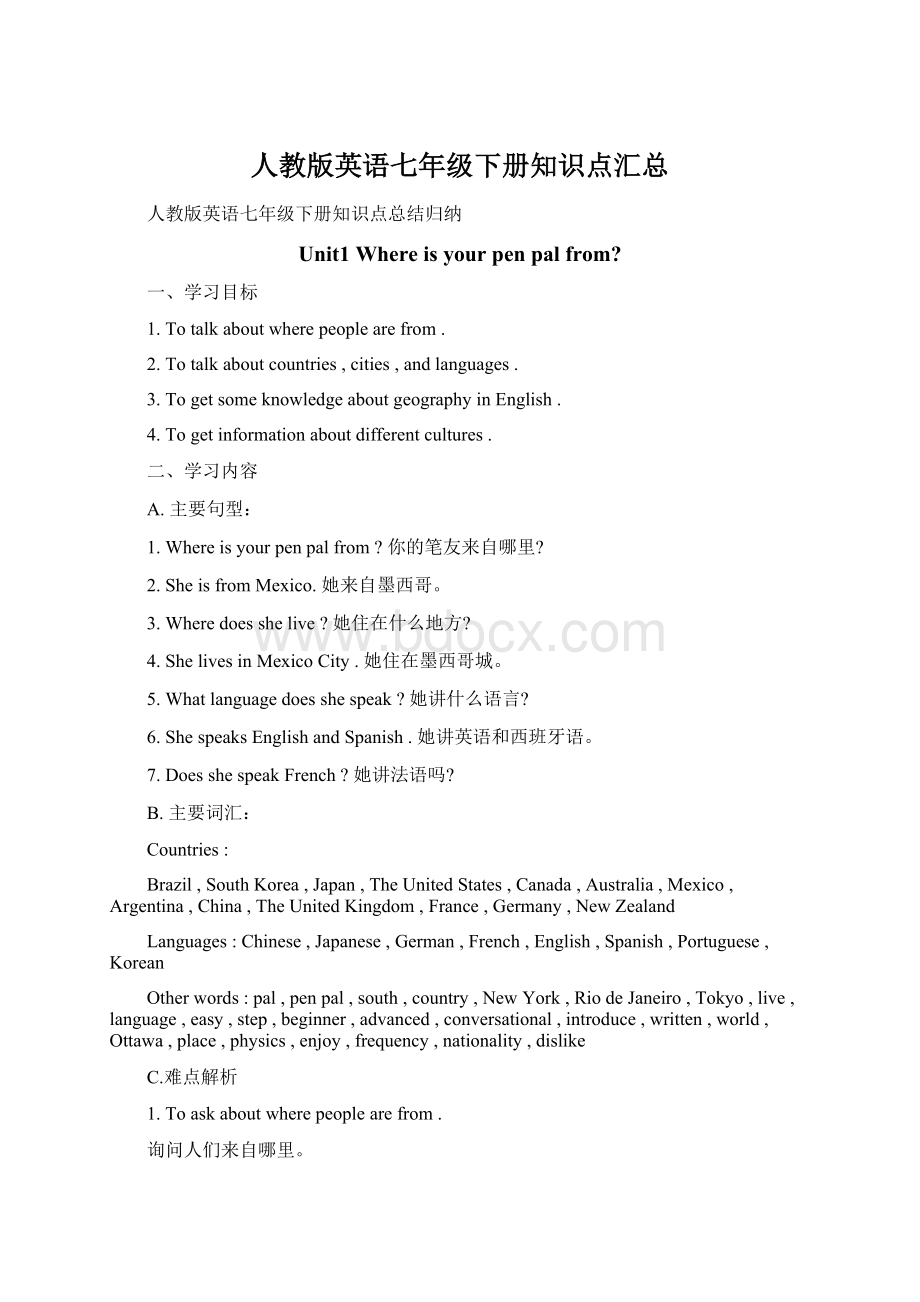人教版英语七年级下册知识点汇总.docx
《人教版英语七年级下册知识点汇总.docx》由会员分享,可在线阅读,更多相关《人教版英语七年级下册知识点汇总.docx(27页珍藏版)》请在冰豆网上搜索。

人教版英语七年级下册知识点汇总
人教版英语七年级下册知识点总结归纳
Unit1Whereisyourpenpalfrom?
一、学习目标
1.Totalkaboutwherepeoplearefrom.
2.Totalkaboutcountries,cities,andlanguages.
3.TogetsomeknowledgeaboutgeographyinEnglish.
4.Togetinformationaboutdifferentcultures.
二、学习内容
A.主要句型:
1.Whereisyourpenpalfrom?
你的笔友来自哪里?
2.SheisfromMexico.她来自墨西哥。
3.Wheredoesshelive?
她住在什么地方?
4.ShelivesinMexicoCity.她住在墨西哥城。
5.Whatlanguagedoesshespeak?
她讲什么语言?
6.ShespeaksEnglishandSpanish.她讲英语和西班牙语。
7.DoesshespeakFrench?
她讲法语吗?
B.主要词汇:
Countries:
Brazil,SouthKorea,Japan,TheUnitedStates,Canada,Australia,Mexico,Argentina,China,TheUnitedKingdom,France,Germany,NewZealand
Languages:
Chinese,Japanese,German,French,English,Spanish,Portuguese,Korean
Otherwords:
pal,penpal,south,country,NewYork,RiodeJaneiro,Tokyo,live,language,easy,step,beginner,advanced,conversational,introduce,written,world,Ottawa,place,physics,enjoy,frequency,nationality,dislike
C.难点解析
1.Toaskaboutwherepeoplearefrom.
询问人们来自哪里。
a.befrom“来自”
(1)Whereisyourpenpalfrom?
“你的笔友来自哪里?
”
(2)MaryandTonyarefromtheUnitedStates.
“Mary和Tony来自美国。
”
(3)I’m/IamfromChina.“我来自中国。
”
b.comefrom“来自”
(1)Wheredoyoucomefrom?
“你来自什么地方?
”
(2)Wheredoesyourpenpalcomefrom?
“你的笔友来自哪里?
”
(3)MypenpalcomesfromKorea.“我的笔友是韩国人。
”
(4)TheycomefromRussia.“他们来自俄罗斯。
”
2.Toaskaboutwhatlanguagespeoplespeak.
询问人们讲什么语言。
(1)Whatlanguagedoyouspeak?
你讲什么语言?
(2)IspeakChinese.我讲汉语。
(3)Whatlanguagedoesyourpenpalspeak?
你的笔友讲什么语言?
(4)HespeaksJapaneseandalittleEnglish.
他讲日语,也讲一点英语。
注意:
“说”某种语言,要用“speak”.不能用其他的动词。
3.Toaskaboutwherepeoplelive.
询问人们居住地。
(1)Wheredoyoulive?
你住在哪里?
IliveinBeijing.我住在北京。
(2)Wheredoesyourpenfriendlive?
你的笔友住在什么地方?
ShelivesinWashington.她住在华盛顿。
注意:
表示在某个城市,介词用“in”
如:
inNewYorkinTokyoinMexicoCity
4.Ilikegoingtothemovieswithmyfriendsandplayingsports.
like“喜欢”,后多跟动词ing形式。
如:
Ilikelisteningtomusic!
MyfatherlikeswatchingTV.
Boyslikeplayingballs.
5.Canyouwritetomesoon?
你可以快些给我写信吗?
writetosb.“给某人写信”
Iwritetomypenpaltwice(两次)amonth.
我每月给我的笔友写两次信。
SometimesIwritetomyparents.
6.Ienjoyphysicsclassatschool.
enjoy“非常喜欢”,指可以从中得到乐趣。
e.g.Ienjoylisteningtoclassicalmusic.
听古典音乐是种享受。
Heenjoyshismeals.他非常满意饭菜。
课后复习资料
一.短语:
1.befrom=comefrom来自于----
2.livein居住在---
3.onweekends在周末
4.writetosb=writealettertosb给某人写信;写信给某人
5.intheworld在世界上
6.inChina在中国
7.penpal笔友
8.14yearsold14岁
9.favoritesubject最喜欢的科目
10.theUnitedStates美国theUnitedKingdom英国NewYork纽
11.speakEnglish讲英语likeanddislike爱憎
12.gotothemovies去看电影playsports做运动
二.重点句式:
1Where’syourpenpalfrom?
=Wheredoesyourpenpalfrom/
2Wheredoeshelive?
3Whatlanguage(s)doeshespeak?
4IwantapenpalinChina.
5IcanspeakEnglishandalittleFrench.6Pleasewriteandtellmeaboutyourself.
7Canyouwritetomesoon?
8Ilikegoingtothemovieswithmyfriendsandplayingsports.
三.本单元的国家,人民、语言对应。
1Canada----Canadian----English/French2France------French------French
3Japan------Japanese----Japanese4Australia----Australian-----English
5theUnitedStates------American----English6theUnitedKingdom---British-----Enghis
Unit2Where’sthepostoffice?
课前预习资料
学习目标
1、掌握表示地点的词汇;
2、掌握where引导的特殊疑问句;
3、能够简单地描述地点方位;
4、能够画出简单的示意图。
语言目标
学习策略与思维技巧
重点词汇
1.掌握表示地点的词汇和短语:
hotel,bank,park,supermarket,street,avenue,new,clean,quiet,big,small,dirty,old,busy,left,right,near,payphone,postoffice,videoarcade,nextto,payphone,acrossfrom,between…and,turnleft/right,gostraight,takeawalk,excuseme,gothrough,takeataxi,arriveat
2.掌握where引导的特殊疑问句;
3.能够简单地描述地点方位;
4.能够画出简单的示意图;
5.Therebe句型以及where句型的问答。
重点和难点
1.重点:
问路和指路。
句型:
Istherea…nearhear/intheneighborhood?
Gostraightandturnleft/right.
It’sdown…ontheleft/right.
2.难点:
要使学生能在看地图给他人指路时,把自己设身处地地放到地图当中去,不然很难搞清楚何为左何为右。
同时要熟练掌握指路时的几个重点句子,能举一反三。
课后复习资料
一.Askingways:
(问路)
1.Whereis(thenearest)……?
(最近的)……在哪里?
2.Canyoutellmethewayto……?
你能告诉我去……的路吗?
3.HowcanIgetto……?
我怎样到达……呢?
4.Isthere……nearhere/intheneighborhood?
附近有……吗?
5.Whichisthewayto……?
哪条是去……的路?
二.Showingtheways:
(指路)
1.Gostraightdown/alongthisstreet.沿着这条街一直走。
2.Turnleftatthesecondturning.在第二个路口向左转。
3.Youwillfinditonyourright.你会在你右手边发现它。
4.Itisaboutonehundredmetresfromhere.离这里大约一百米远。
5.You’dbettertakeabus.你最好坐公交车去。
(You’dbetter+动词原形)
三.词组
1.acrossfrom……在……的对面acrossfromthebank在银行的对面
2.nextto……紧靠……nexttothesupermarket紧靠超市
3.between……and……在……和……之间
betweentheparkandthezoo在公园和动物园之间
among表示位于三者或三者以上之间
4.infrontof……在……前面Thereisatreeinfrontoftheclassroom.课室前面有棵树。
inthefrontof……在……(内)的前部Thereisadeskinthefrontoftheclassroom.
课室内的前部有张桌子。
5.behind……在……后面behindmyhouse在我家后面
6.turnleft/right向左/右拐
ontheleft/rightof……在某物的左/右边ontheleftofourschool在我们学校的左边
onone’sleft/right在某人的左/右边onmyleft在我左边
7.gostraight一直走
8.down/along……沿着……(街道down/alongCenterStreet沿着中央街
9.intheneighborhood=nearhere在附近
10welcometo……欢迎来到……
11.take/haveawalk散步
12.thebeginningof…………的开始,前端
atthebeginningof……在……的开始,前端inthebeginning起初,一开始
13.havefun=haveagoodtime=enjoyoneself玩得开心,过得愉快
我昨天玩得很开心。
Ihadfunyesterday.Ihadagoodtimeyesterday.Ienjoyedmyselfyesterday.
14.haveagoodtrip旅途愉快
15.takeataxi坐出租车
16.到达:
getto+地方gethere/there/home到这/那/家
arrivein+大地方IarriveinBeijing.arriveat+小地方Iarriveatthebank.reach+地方
17.goacross从物体表面横过goacrossthestreet横过马路
gothrough从空间穿过gothroughtheforest穿过树林
18.on+街道的名称。
Eg:
onCenterStreet
at+具体门牌号+街道的名称Eg:
at6CenterStreet
三.重难点解析
1.enjoydoingsth享受做某事的乐趣,喜爱做某事Ienjoyreading.我喜爱读书。
到目前为止,我们学了两个特殊的动词finish和enjoy,都是要带doing.
Ifinishcleaningtheroom.我扫完了这间屋子。
2.hopetodosth希望做某事Ihopetopassthisexam.我希望通过这次考试。
hope+从句Ihopetomorrowwillbefine.我希望明天将会晴朗。
(从句即是一个小句子,这个小句子又放在大句子中,从属于大句子,所以叫从句。
如tomorrowwillbefine是一个从句,它又放在Ihope的后面,形成句中有句。
)
3.if引导一个表示假设的句子。
IfIhavemuchmoney,Iwillgotothemoon.如果我有许多钱,我就会去月球。
Ifyouarehungry,youcanbuysomefoodinthesupermarket.
如果你饿了的话,你可以在超市买一些食物。
四.本单元的反义词、近义词配对
1、new—old2、quiet---busy3、dirty---clean4、big----small
Unit3Whydoyoulikekoalas?
一.重点词组
eatgrasseatleavesbequietveryshyverysmartverycute
playwithherfriendskindofSouthAfricaotheranimals
atnightinthedayeverydayduringtheday
二.交际用语
1.Whydoyoulikepandas?
Becausethey’reveryclever.
2.Whydoeshelikekoalas?
Becausethey’rekindofinteresting.
3.Wherearelionsfrom?
TheyarefromSouthAfrica.
4.Whatotheranimalsdoyoulike?
Ilikedogs,too.Why?
Becausethey’refriendlyandclever.
5.Mollylikestoplaywithherfriendsandeatgrass.
6.She’sveryshy.
7.HeisfromAustralia.
8.Hesleepsduringtheday,butatnighthegetsupandeatsleaves.
9.Heusuallysleepsandrelaxes20hourseveryday.
10.Let’sseethepandasfirst.
11.They’rekindofinteresting.
12.Whatotheranimalsdoyoulike?
13.Whydoyouwanttoseethelions?
三.重点难点释义
1、kindof有点,稍微Koalabearsarekindofshy.考拉有点害羞。
kind还有“种类”的意思
如:
各种各样的allkindsofWehaveallkindsofbeautifulflowersinourschool.
2、Chinan.中国African.非洲
China和Africa都是专有名词,首字母都应该大写,而且和介词in连用。
TherearemanykindsoftigersinChina.TherearemanykindsofscaryanimalsinAfrica.
3、friendlyadj.友好的,和蔼可亲的
它是名词friend的形容词形式,常常和be动词连用,befriendly。
ThepeopleinChengduareveryfriendly.
4、withprep.跟,同,和…在一起
Iusuallyplaychesswithmyfather.
注意区别与and的用法,and通常用于连接主语或宾语,连接主语时,
如果有I,I通常放在and之后,如:
MyfatherandIusuallyplaychesstogether.
Playwith“和…一起玩耍”“玩…”
Ioftenplaywithmypetdog.Don’tplaywithwater!
5、day和night是一对反义词,day表示白天或一天,night表示夜或夜晚。
通常说intheday,duringtheday,atnight。
Koalabearsoftensleepduringthedayandeatleavesatnight.
6、leafn.叶子
复数形式为:
leaves,类似的变化还有:
wife—wives,wolf—wolves,
knife—knives,scarf---scarfs(scarves)等。
7、hourn.小时;点钟hour前边通常加上冠词an表示“一个小时”,即:
anhour。
Thereare24hoursinadayand60minutesinanhour.
8、befrom来自…befrom=comefrom
PandasarefromChina.=PandascomeformChina.
9、meatn.(食用的)肉,为不可数名词,表示“许多”时,使用much来修饰,即:
muchmeatHeeatsmuchmeateveryday.
10、grassn.草,为不可数名词,表示“许多”时,使用much来修饰,即:
muchgrass。
Thereismuchgrassontheplayground.
四.语法知识
特殊疑问句通常以“what”、“who”、“which”、“when”、“where”、“how”、“howold”、“howmany”等开头,对某一具体问题进行提问。
特殊疑问句的基本构成有两种情况:
1.疑问句+一般疑问句结构。
这是最常见的情况。
例如:
What’syourgrandfather’stelephonenumber?
你爷爷的电话号码是多少?
Whoisthatboywithbigeyes?
那个大眼睛的男孩是谁?
Whichseasondoyoulikebest?
你最喜欢哪个季节?
Whenishegoingtoplaythepiano?
他什么时候弹钢琴?
Wheredoeshelive?
他住在哪儿?
Howareyou?
你好吗?
Howoldareyou?
你多大了?
Howmanybrothersandsistersdoyouhave?
你有几个兄弟姐妹?
2.疑问句+陈述句结构。
这时疑问词作主语或修饰主语。
例如:
Whoisondutytoday?
今天谁值日?
Whichmanisyourteacher?
哪位男士是你的老师?
我们学过的What/Howabout+名词/代词+其他?
也是特殊疑问句,它是一种省略结构。
例如:
IlikeEnglish.What/Howaboutyou?
我喜欢英语。
你呢?
Whataboutplayingbasketball?
打篮球怎么样?
Unit4Iwanttobeanactor
一.短语:
1wanttodosth想要作某事
2givesbsth=givesthtosb给某人某物/把某物给某人
3helpsbdosth帮助某人作某事Eg:
Iwanttohelpmymotherdosomehouseworkathome.
4helpsbwithsth帮助某人谋事Eg:
Iwanttohelpmymotherwithsomehouseworkathome
5intheday在白天
6atnight在晚上
7talkwith/tosb和----谈话
8bebusydoingsth忙于做某事Eg:
Heisbusylisteningtotheteacher.
9inahospital在医院
10work/studyhard努力工
11EveningNewspaper晚报
二.重点句式及